- Research
- Research Centers
- Journals
- Admission
- Introduction
- Programs
- Application
- Alumni & Giving
- Alumni Club
- Giving
The Sixth National High-end Forum on Foreign Language Education Reform and Development for Higher Education Institutions was held from March 19 to 20 at Foreign Language Teaching and Research Press (FLTRP) in Beijing.
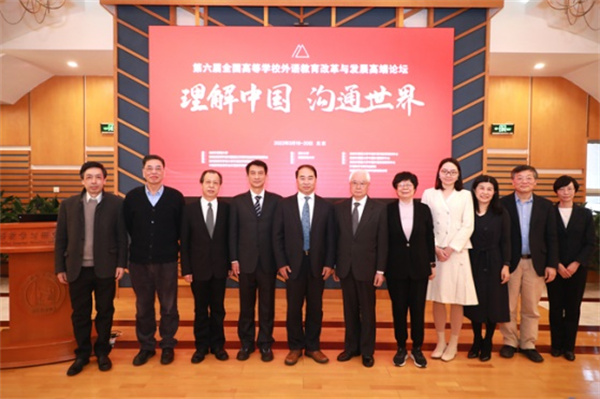
The Sixth National High-end Forum on Foreign Language Education Reform and Development for Higher Education Institutions is held from March 19 to 20 at FLTRP.[Photo/bfsu.edu.cn]
With the theme “Understanding China and Communicating with the World”, the forum was hosted by Beijing Foreign Studies University (BFSU), the Advisory Committee of Foreign Language and Literature Teaching in Higher Education and the Advisory Committee of College Foreign Language Teaching in Higher Education under the Ministry of Education (MOE) and the Foreign Language Teaching and Research Branch of the China Association of Higher Education. Representatives from the Publicity Department of the CPC Central Committee, the MOE and education circles attended the event.
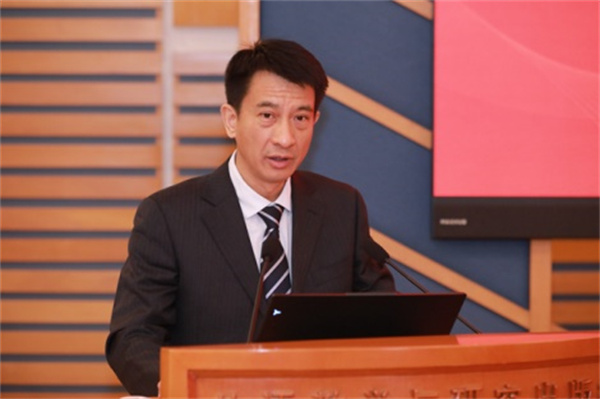
Chen Xueliang, deputy director of the International Communication Bureau at the Publicity Department of the CPC Central Committee, speaks at the forum. [Photo/bfsu.edu.cn]
Chen Xueliang, deputy director of the International Communication Bureau at the Publicity Department of the CPC Central Committee, gave a keynote speech titled Cultivating Excellent Translation Talents to Boost Communication between China and the World. According to Chen, translation is the foundation of better telling Chinese stories and strengthening international communication.
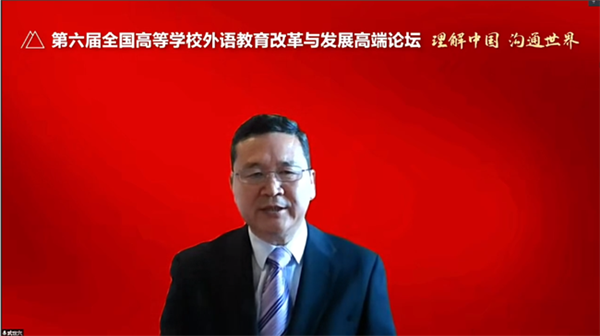
Wu Shixing, deputy director of the Department of Higher Education at the MOE, stresses the significance of innovation in higher foreign language education at the forum. [Photo/bfsu.edu.cn]
Wu Shixing, deputy director of the Department of Higher Education at the MOE, delivered a keynote report titled Deepening the Construction of New Liberal Arts and Cultivating Foreign Language Talents in the New Era. Wu said China's higher education has undergone great transformations amid profound changes unseen in a century. In this context, high-quality development should be considered as the main task, serving national strategies should be seen as the greatest demand and the development of new engineering, medicine, agriculture and liberal arts should be regarded as the main approach.
Wu also stressed the significance of innovation in higher foreign language education.
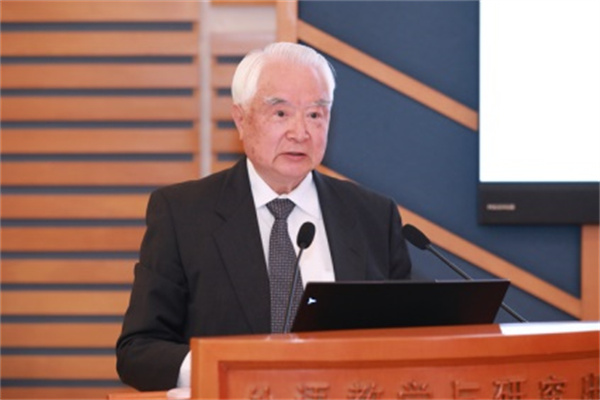
Zha Peixin, former Chinese ambassador to the United Kingdom, gives a keynote report at the forum. [Photo/bfsu.edu.cn]
Zha Peixin, former Chinese ambassador to the United Kingdom, gave a keynote report titled Great Missions, Glorious Tasks, Forge Ahead and Make More Contributions. He noted that foreign language universities have advantages and play a vital role in the pursuit of understanding China and interacting with the world, and they need to make greater contributions and nurture talents with determination, patriotism, global vision, international literacy and foreign language proficiency to realize China's national rejuvenation.
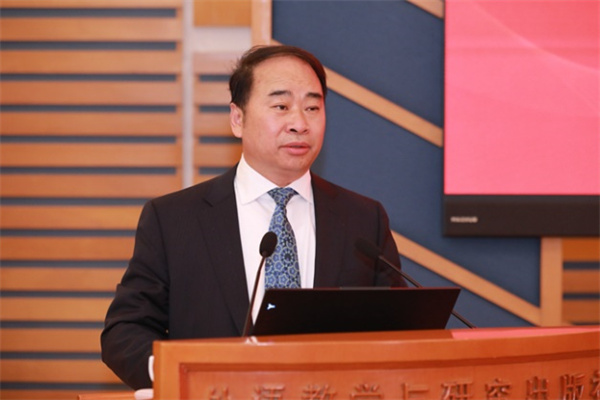
Wang Dinghua, secretary of the CPC BFSU committee, delivers a keynote speech at the forum.[Photo/bfsu.edu.cn]
Wang Dinghua, secretary of the CPC BFSU committee, delivered a keynote speech titled Enhancing Chinese Universities’ Involvement in Global Governance, stressing the importance of consolidating foreign language universities and discipline construction and improving the ability to participate in global governance.
As one of the key participants in global governance, higher education institutions have a long way to go in global education governance and must contribute their wisdom and strength, Wang said. These institutions should follow the principles of inclusiveness, compatibility, commonality and a broad vision, and faculty members should form a global perspective, perform their patriotic duty, hone their professional competence and shoulder their responsibilities.
Wang put forward 10 measures for Chinese universities to participate in global governance. He suggested that these institutions should enhance students' global competence, cultivate international traits, train talents for international organizations, increase the influence of Chinese universities in a global context, introduce high-quality overseas educational resources, explain China's global governance philosophy, conduct area studies, participate in the formulation of global governance rules and mechanisms, provide assistance for international education, and fuel cultural and educational exchanges between China and foreign countries.
Nine thematic forums were held during the forum, with 92 speakers exchanging views on the new pattern and development of China's higher education in foreign languages.
Representatives from the National Research Centre for Foreign Language Education, the Academic Affairs Office, the School of English and International Studies, the School of Russian, the Department of Hispanic and Portuguese and the School of German Studies gave speeches.
FLTRP announced its project on international talent training of industry-oriented foreign languages, the 11th national foreign language education fund project, the Report on the Development of Chinese College Students' English Communication Ability (2016-20) and the 2021 Annual Report on English Evaluation and Teaching at the forum.
Details about the FLTRP Star Teacher Contest, FLTRP·ETIC Cup International Communication Strength Short Video Contest and FLTRP·ETIC Cup English Public Speaking Contest were also announced.
The forum also saw the release of several textbook series, including Contemporary College English (third edition) and Over to You, and invited editors and college teachers to discuss the production and utilization of high-quality foreign language teaching materials.